The Intel Xeon W Review: W-2195, W-2155, W-2123, W-2104 and W-2102 Tested
by Ian Cutress & Joe Shields on July 30, 2018 1:00 PM EST- Posted in
- CPUs
- Intel
- Xeon
- Workstation
- ECC
- Skylake-SP
- Skylake-X
- Xeon-W
- Xeon Scalable
Benchmarking Performance: CPU Office Tests
The office programs we use for benchmarking aren't specific programs per-se, but industry standard tests that hold weight with professionals. The goal of these tests is to use an array of software and techniques that a typical office user might encounter, such as video conferencing, document editing, architectural modelling, and so on and so forth.
All of our benchmark results can also be found in our benchmark engine, Bench.
Chromium Compile (v56)
Our new compilation test uses Windows 10 Pro, VS Community 2015.3 with the Win10 SDK to combile a nightly build of Chromium. We've fixed the test for a build in late March 2017, and we run a fresh full compile in our test. Compilation is the typical example given of a variable threaded workload - some of the compile and linking is linear, whereas other parts are multithreaded.
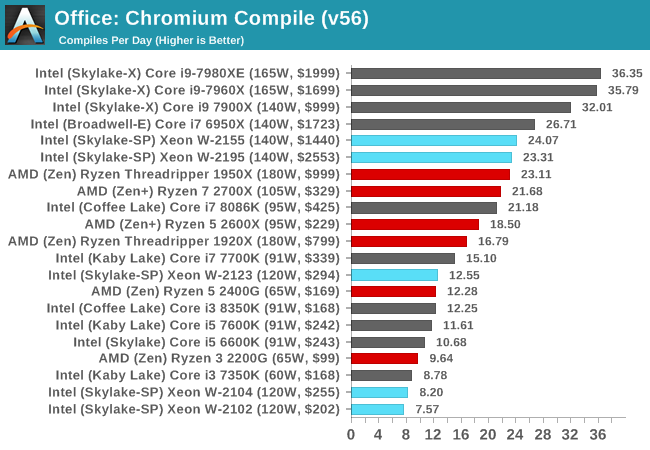
Our popular Chrome Compile test gives a good showing for the Intel CPUs, however the higher-powered Core i9 processors perform a lot better here - up to 50% in fact. Part of this is down to memory; the DDR4-2666 C19 memory is slower than the DDR4-2666 C16 used in our Core i9 reviews. However, there might also be a case for power draw - the BIOS defaults for the Core i9 processors allow for a lot more power consumption, which the Xeon W processors might not be able to tap in to. It is worth noting that the W-2155 wins against the W-2195, showing that in this test frequency matters as much as cores.
SYSmark 2014 SE: link
SYSmark is developed by Bapco, a consortium of industry CPU companies. The goal of SYSmark is to take stripped down versions of popular software, such as Photoshop and Onenote, and measure how long it takes to process certain tasks within that software. The end result is a score for each of the three segments (Office, Media, Data) as well as an overall score. Here a reference system (Core i3-6100, 4GB DDR3, 256GB SSD, Integrated HD 530 graphics) is used to provide a baseline score of 1000 in each test.
A note on context for these numbers. AMD left Bapco in the last two years, due to differences of opinion on how the benchmarking suites were chosen and AMD believed the tests are angled towards Intel processors and had optimizations to show bigger differences than what AMD felt was present. The following benchmarks are provided as data, but the conflict of opinion between the two companies on the validity of the benchmark is provided as context for the following numbers.
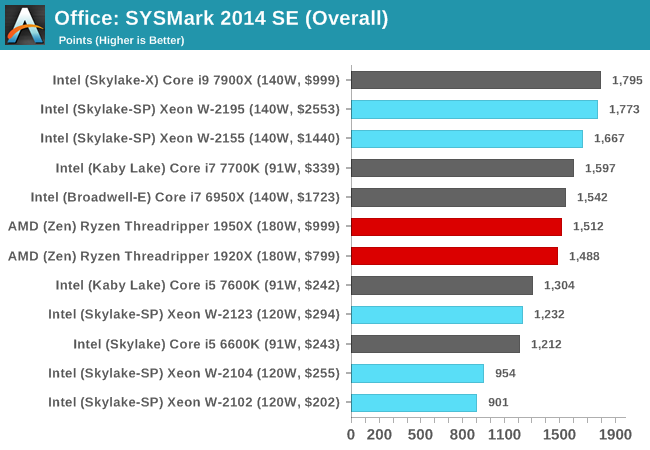
PCMark 10: link
PCMark 10 is the latest all-in-one office-related performance tool that combines a number of tests for low-to-mid office workloads, including some gaming, but focusing on aspects like document manipulation, response, and video conferencing.
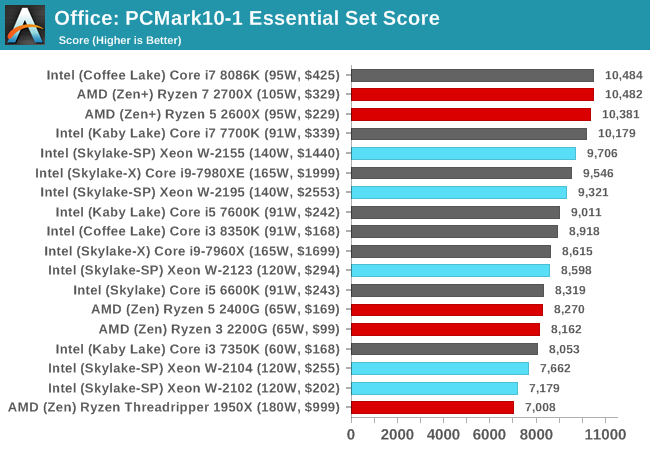
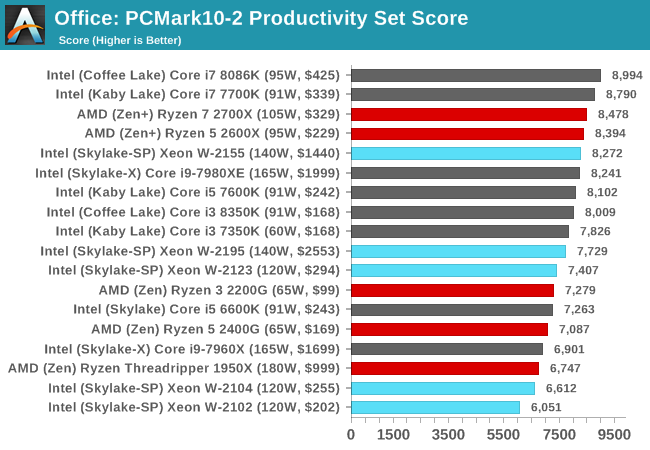
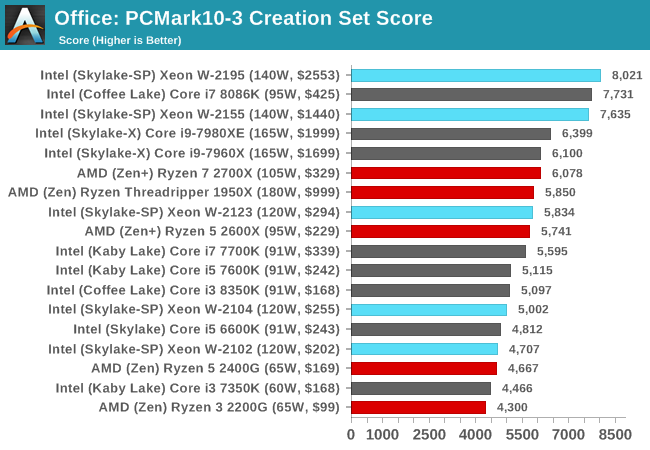
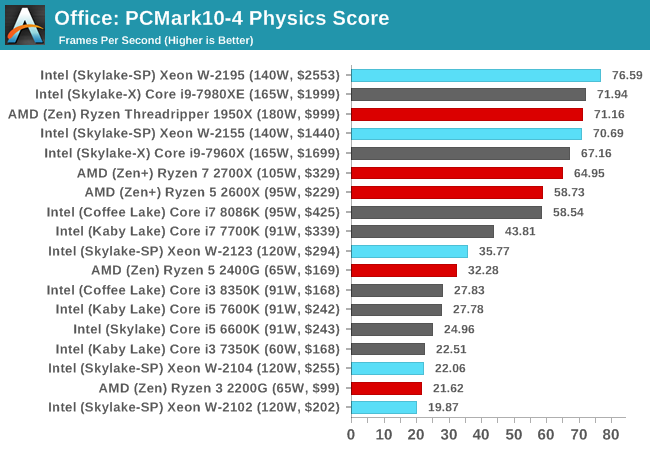
In the Physics score, the W-2195 takes a commanding lead, however the W-2155 is not far behind, offering a better performance per dollar metric. Both are outclassed by the Threadripper 1950X in this test, however. In fact, the only test where Xeon W truly wins is in the Creation test.
GeekBench4: link
GB4 is a popular tool in benchmarking, with most users liking its cross-platform functionality. Due to requests, we are including the data in our reviews. Our benchmark database has a more detailed breakdown of the sub-sections in the test.
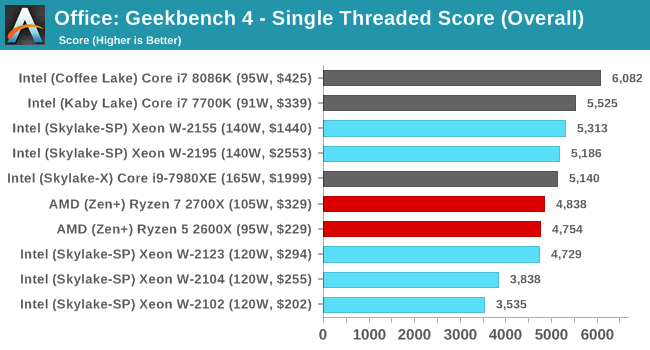
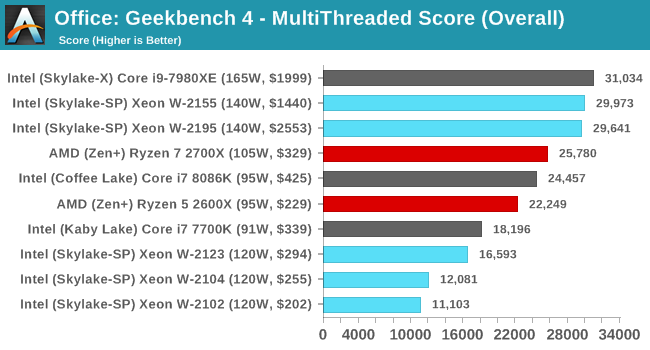
GeekBench 4 is still a newer benchmark in our test suite, hence the lack of comparative results.
PCMark8: link
Despite originally coming out in 2008/2009, Futuremark has maintained PCMark8 to remain relevant in 2017. On the scale of complicated tasks, PCMark focuses more on the low-to-mid range of professional workloads, making it a good indicator for what people consider 'office' work. We run the benchmark from the commandline in 'conventional' mode, meaning C++ over OpenCL, to remove the graphics card from the equation and focus purely on the CPU. PCMark8 offers Home, Work and Creative workloads, with some software tests shared and others unique to each benchmark set.
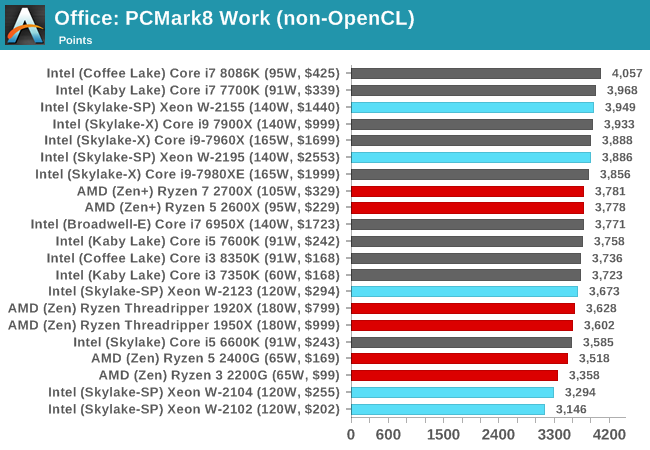
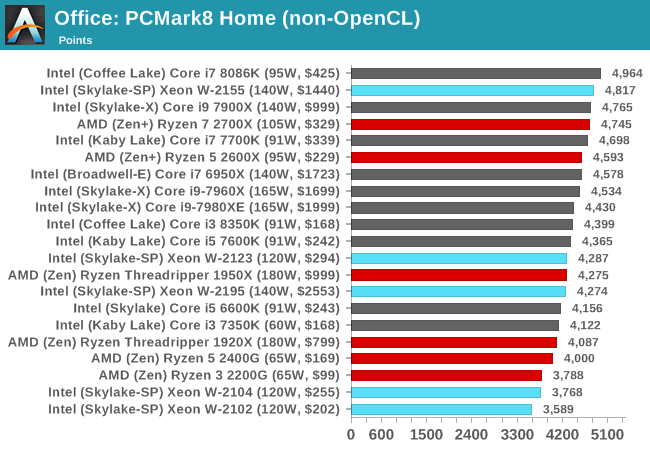
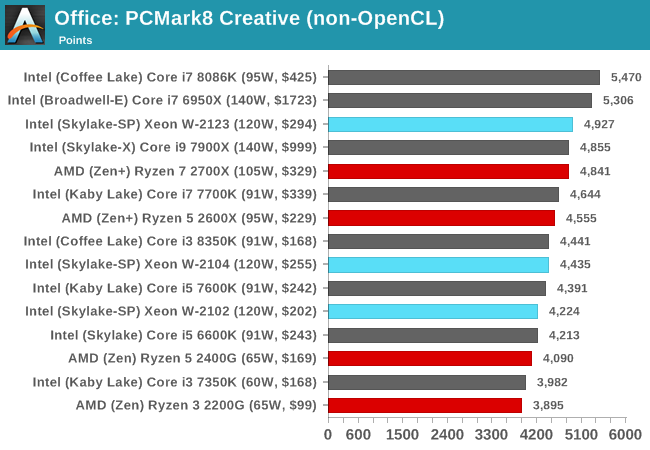
[words]










74 Comments
View All Comments
0ldman79 - Tuesday, July 31, 2018 - link
Agreed.I imagine there will be several situations where the 6 core 12 thread i7 will outperform the i9 9700.
If the cache increase is enough that may not happen, but I'm not betting on it making up enough of a difference.
Icehawk - Friday, August 3, 2018 - link
The 8086 is functionally equivalent to the 8700, they trade blows in a pretty tight grouping so I don’t mind that they used it’s scores.mode_13h - Monday, July 30, 2018 - link
Their pricing is nuts! These can only make sense if you're desperate for PCIe lanes or lots of cores (and, for some reason, don't want AMD).I have an older E5 Xeon and wanted to replace it with a W-series, but I can't justify this pricing (or the performance hit taken on the lower-core-count models, relative to desktop/E-series chips). I will have to opt for either an E-series Xeon or a Ryzen. At this rate, I see myself going for a 7 nm Ryzen, actually.
I think AMD is smart for using narrow AVX units. > 256-bit doesn't really make sense for much that wouldn't be better-served by a GPU. AVX-512 was a strategic misstep for Intel, and they're just going to have to live with it.
mode_13h - Monday, July 30, 2018 - link
Oh, and let's not forget the IHS TIM issue.I'm not in the market for > 8 cores, but those who are will be disappointed by the rate of thermal throttling, due to this being their first (recent) workstation/HEDT chip with a non-soldered IHS.
0ldman79 - Tuesday, July 31, 2018 - link
I missed that.The IHS is using TIM even on the Xeon now?
That was honestly the one big reason I was looking at the Xeon. That's just a poor business decision. Xeon carries a price premium, they could at least guarantee the heat conductivity is going to be enough to keep it running cool and smoothly for the life of the chip.
mode_13h - Wednesday, August 1, 2018 - link
I don't know this for a fact, but their Xeons are normally just binned HEDT processors without the special features fused off. So, I assume it's the same crappy TIM under that IHS.Comparing thermal performance @ the same clock for 10+ core models vs the i9's would easily show whether this is true.
HStewart - Monday, July 30, 2018 - link
"I think AMD is smart for using narrow AVX units. > 256-bit doesn't really make sense for much that wouldn't be better-served by a GPU. AVX-512 was a strategic misstep for Intel, and they're just going to have to live with it."AMD's AVX 2 is only 1/2 of Intel AVX 2 - that sound like they are using dual 128 bits instead 256 bits
Also keep in mind Intel CPU also have AVX 2 support your statement makes no sense.
HStewart - Monday, July 30, 2018 - link
https://forums.anandtech.com/threads/ryzens-halved...bill.rookard - Monday, July 30, 2018 - link
The thing is - and this is somewhat critical for a workstation based board, you're NOT really going to be using it for single threaded tasks. You'll be using software which has for the most part SHOULD be multi-threaded. Considering that the Threadripper is a 16c/32t CPU in the gen1, and running for a street price of about $800ish, and the gen2 is going to be a 32c/64t beastie of a CPU at a price of $1500ish, why would you spend $2500 on a 18c/36t Intel CPU?You could just as easily do some research to find people who have indeed put together some TR/ECC combos, and put a complete AMD system for the price of an Intel CPU alone.
mode_13h - Tuesday, July 31, 2018 - link
That's nuts, dude. For software development, I want lotsa cores for parallel builds. When recompiling only a few files, I want fast single-thread perf.The reality is that there are still lots of places in day-to-day computing where single-thread perf matters. I don't know how you can possibly believe you accurately represent the needs of all workstation users, but you don't.